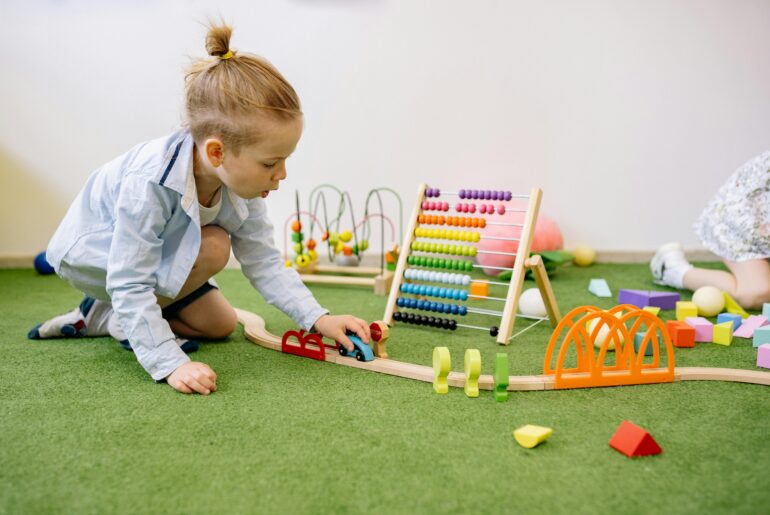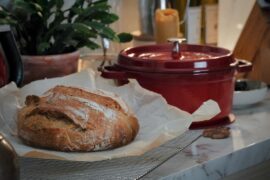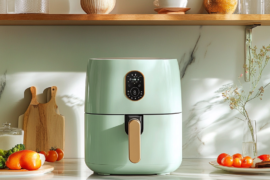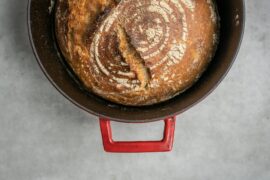This article may contain references to products or services from one or more of our advertisers or partners. We may receive compensation when you click on links to those products or services. Nonetheless, our opinions are our own.
Pretend play is one of the most natural ways for young children to learn. Among the most beloved toys in many households are kid’s kitchen sets, which allow children to explore the world of cooking and household tasks. Let’s see how these engaging toys contribute to improving developmental skills that go beyond simple pretend play.
Encouraging Storytelling
A kids play kitchen sparks the imagination by offering children the opportunity to create their own stories. Whether pretending to bake cookies, cook dinner, or serve a pretend meal, kids immerse themselves in scenarios that mirror real-life experiences. These scenarios allow them to practice problem-solving and create new stories every time they engage with their kitchen set.
The open-ended nature of pretend play with a kitchen helps children invent their own narratives. Each time they play, the story can change, allowing for flexibility and growth in their creativity. Besides, this freeform storytelling builds language skills as children describe what they are doing, enhancing both vocabulary and expressive abilities.
When children engage in pretend cooking or sharing a meal, they learn important social skills. Kids often play together, taking turns, sharing toys, and acting out different roles in their pretend kitchen. These interactions encourage cooperation, patience, and understanding as children work together to prepare meals or serve customers.
Through these playful moments, they also practice empathy by imagining how others feel or what they might like to eat. Over time, these small role-playing scenarios help build confidence in expressing themselves and navigating group dynamics.
Improving Hand-Eye Coordination
Using a kid’s kitchen helps children improve their fine motor skills. Tasks such as stirring, pouring, or arranging food items on plates require careful hand movements. These activities strengthen small hand muscles, enhancing dexterity and hand-eye coordination, which are vital for tasks like writing, dressing, or using utensils later in life.
Manipulating kitchen tools and utensils further teaches children to focus and refine their movements. As they practice these small tasks, their ability to perform more complex actions increases. Repeated practice with these everyday movements can lead to greater independence and confidence in handling real-world tasks in the future.
Encouraging Cognitive Development
Pretend kitchens offer excellent opportunities for cognitive development. When children play, they begin to understand cause and effect: if they put a bowl in the oven, it needs to be taken out after some time, or if they mix ingredients, they get a different result. These basic problem-solving skills lay the foundation for more complex thinking as children grow.
Additionally, playing with a kid’s kitchen can help children learn about numbers, measurements, and sorting. They might pretend to measure ingredients, count plates, or organize utensils, all of which support early math skills. Through these activities, children practice logical thinking while making sense of the world around them in an interactive and hands-on way.
How Do Play Kitchens Foster Long-Term Learning and Growth?
By encouraging children to act out real-world scenarios, play kitchens help children gain life skills that last a lifetime. These toys provide not just fun but essential learning opportunities that will stay with them as they grow. Through social interaction, imaginative play, and problem-solving, children develop a deeper understanding of everyday activities.
Engaging with a kids play kitchen is more than just a fun activity; it’s a rich experience that nurtures creativity, learning, and growth. These toys allow children to explore new ideas, develop important social and motor skills, and dive into real-life scenarios in an imaginative way. As children pretend to cook and serve, they’re not just having fun—they’re building a strong foundation for their future learning and emotional development.

Reviewed and edited by Albert Fang.
See a typo or want to suggest an edit/revision to the content? Use the comment form below for feedback.
At FangWallet, we value editorial integrity and open collaboration in curating quality content for readers to enjoy. Much appreciated for the assist.
Did you like our article and find it insightful? We encourage sharing the article link with family and friends to benefit as well - better yet, sharing on social media. Thank you for the support! 🍉
Article Title: How Pretend Play Kitchens Foster Creativity and Learning in Young Children
https://fangwallet.com/2025/04/23/how-pretend-play-kitchens-foster-creativity-and-learning-in-young-children/The FangWallet Promise
FangWallet is an editorially independent resource - founded on breaking down challenging financial concepts for anyone to understand since 2014. While we adhere to editorial integrity, note that this post may contain references to products from our partners.
The FangWallet promise is always to have your best interest in mind and be transparent and honest about the financial picture.
Become an Insider
Editorial Disclaimer: The editorial content on this page is not provided by any of the companies mentioned. The opinions expressed here are the author's alone.
The content of this website is for informational purposes only and does not represent investment advice, or an offer or solicitation to buy or sell any security, investment, or product. Investors are encouraged to do their own due diligence, and, if necessary, consult professional advising before making any investment decisions. Investing involves a high degree of risk, and financial losses may occur including the potential loss of principal.
Source Citation References:
+ Inspo
There are no additional citations or references to note for this article at this time.











































